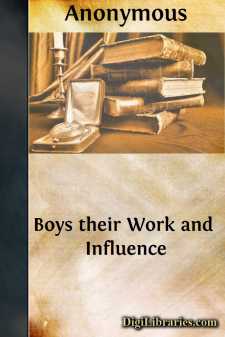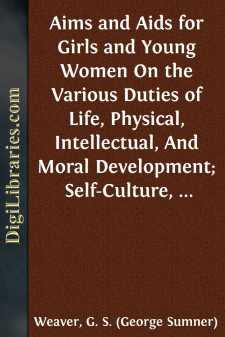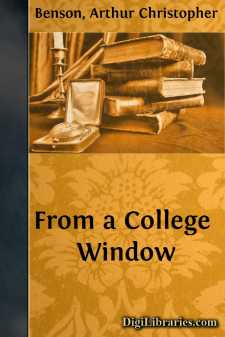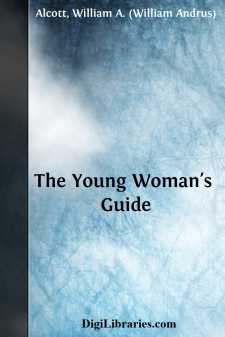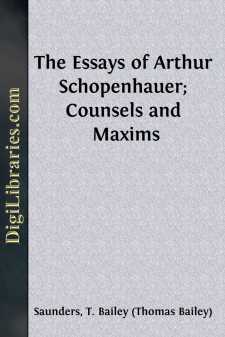Juvenile Nonfiction
- Animals 10
- Art 1
- Biography & Autobiography 2
- Boys & Men 1
- Business & Economics 3
- Cooking & Food 2
- Gardening 1
- General 32
- Girls & Women 7
- History 2
- Holidays & Celebrations 1
- Lifestyles 79
- Literary Criticism & Collections 5
- Nature 11
- Readers 40
- Religion 4
- Sports & Recreation 1
Juvenile Nonfiction Books
Sort by:
CHAPTER I. IMPORTANCE OF THE TIME OF YOUTH; DIFFICULTIES AND DANGERS THAT WOMEN MEET WITH IN LIFE, AND THE NECESSITY OF PROVIDING FOR THEM. The most important period of life is that in which we are the better able, in making good use of the present, to repair the past and prepare for the future; that period holds the intermediate place between the age of infancy and the age of maturity, embracing the...
more...
by:
Anonymous
INTRODUCTION The following papers were written at the request of one who had read the somewhat similar papers addressed to girls. The object aimed at in both books has been to try and help Boys and Girls of the so-called working classes to recognize their duties to God and their neighbour, and to use on the side of right the powers and opportunities which God has given them. It seems to the author...
more...
by:
Paul Hutchens
One tough guy in the Sugar Creek territory was enough to keep us all on the lookout all the time for different kinds of trouble. We'd certainly had plenty with Big Bob Till, who, as you maybe know, was the big brother of Little Tom Till, our newest gang member. But when a new quick-tempered boy whose name was Shorty Long, moved into the neighborhood and started coming to our school, and when...
more...
Lecture One. GIRLHOOD. If the angels look down upon earth and behold any natural object with especial delight, it must be Girlhood. And yet if they are not gifted with prophetic vision, they must tremble with fearful solicitude while they gaze delighted. There is a fearfulness in the beauty of Girlhood which mingles anxiety in the cup of admiration. No good being can look upon it without casting a...
more...
by:
Samuel Smiles
CHAPTER I.—INFLUENCE OF CHARACTER. "Unless above himself he can Erect himself, how poor a thingis man"—DANIEL. "Character is moral order seen through the medium, of anindividual nature.... Men of character are the conscience ofthe society to which they belong."—EMERSON. "The prosperity of a country depends, not on the abundanceof its revenues, nor on the strength of its...
more...
EXTRAVAGANCE AT COLLEGE Young Sardanapalus recently remarked that the only trouble with his life in college was that the societies and clubs, the boating and balling, and music and acting, and social occupations of many kinds, left him no time for study. He had the best disposition to treat the faculty fairly, and to devote a proper attention to various branches of learning, and he was sincerely sorry...
more...
by:
Harvey Newcomb
A MAN’S character is formed early in life. There may be some exceptions. In some instances, very great changes take place after a person has grown to manhood. But, even in such cases, many of the early habits of thought, feeling, and action still remain. And sometimes, we are disappointed in the favorable appearances of early life. Not unfrequently the promising boy, in youth or early manhood, runs a...
more...
THE POINT OF VIEW I have lately come to perceive that the one thing which gives value to any piece of art, whether it be book, or picture, or music, is that subtle and evasive thing which is called personality. No amount of labour, of zest, even of accomplishment, can make up for the absence of this quality. It must be an almost wholly instinctive thing, I believe. Of course, the mere presence of...
more...
CHAPTER I. EXPLANATION OF TERMS. Defining terms. The word excellence here used as nearly synonym with holiness. What is meant by calling the work a Guide. The term Woman— why preferable, as a general term, to Lady. The class to whom this work is best adapted. It has been said, and with no little truth, that a large proportion of the disputes in the world might have been avoided, had the disputants...
more...
CHAPTER I. GENERAL RULES.—SECTION 1. The first and foremost rule for the wise conduct of life seems to me to be contained in a view to which Aristotle parenthetically refers in the Nichomachean Ethics:[1] [Greek: o phronimoz to alupon dioke e ou to aedu] or, as it may be rendered, not pleasure, but freedom from pain, is what the wise man will aim at. [Footnote 1: vii. (12) 12.] The truth of this...
more...



